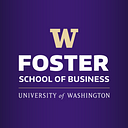Shared Legacy: Insights From a Founding Board Member
Written By: Charles Trillingham
In 1991–92, a group of individuals driven by a desire to empower students to solve real-world problems, and to innovate and lead the Seattle business ecosystem forward, organized the first advisory board for the Program in Entrepreneurship and Innovation at the University of Washington. Those same values live on today in the Foster School of Business as it looks to advance the leaders, insights and betterment of humanity well into the future.
Among those influential first board members is a self-described “non-entrepreneur.” Ron Howell retired in April 2021 as CEO of the Washington Research Foundation after 32 years but remains engaged with the Buerk Center and student entrepreneurs. His leadership has impacted the evolving landscape of the bio- and health-technology startup ecosystem in Seattle.
If you asked Howell to tell you what was true in 1991–92 that is still true now, he’ll point to the courage, smarts and infectious energy of the students, first and foremost. But that’s not all.
In his own words, he graciously offered to share this simultaneous look back-and forward, as one of the true original patrons of the program.
There have been lectures on how the program or the events have changed, grown, or become more popular, but all that stuff is like reading a phone book until you get to one of the competitions. It’s all about the students, the students, the students-their infectious energy, smarts, their tactics, and their courage, and how they put in their hearts and souls to try and succeed.
I’ve been on the advisory board through five Deans. For the program to survive the vision of five deans only underscores the importance of entrepreneurship in a modern competitive business school. Every single one of them thought that this program was worth keeping and in fact, improving.
Can you imagine if a medical school graduated people and none of them ended up as actual practicing surgeons? That’s like a business school that doesn’t have practicing entrepreneurs roaming the hallway.
I knew in 1991–92 that universities in general were interested in creating startups out of technology-based businesses, which is still true today. Alvin Kwiram (UW emeritus professor and emeritus vice provost for research) asked the Washington Research Foundation if we would help think about and fund early-stage startup companies. The answer was simple. But he was the first person that came into my career, my trajectory, that informed me that the university wasn’t indifferent to startups. It knew that startups had to become not just a part of the culture, but that it had to also become a partner to them.
Even 30 years ago, the people graduating with PhD’s had a small chance of getting a job as faculty in research the rest of their lives, something like 16%. So, what happens to the other 84%? Many will need to take command of their own futures and try and build something that inspires and provides value for other people. That looks more and more like a startup. And if you want to become wealthy and command the type of wealth that will not only allow you to buy stuff you don’t need, but help shape a region, then you need to create a lot of wealth. That comes through associating yourself and taking risk in a company long enough to see it appreciate greatly. You create an opportunity for yourself, a place of employment for other people, and you help improve the region’s wealth and economy.
There’s risk, but on the other hand, there’s the opportunity to get a tremendous amount of experience that you likely wouldn’t get if you were just a worker bee.
So, why do people join the board? Especially somebody like me who doesn’t have a business degree and didn’t go to the University of Washington? Well, I joined, in part, because of the excitement that comes from helping the University of Washington entrepreneurship program. The board has always been a collection of people with really interesting backgrounds and a great treasure trove of expertise to draw upon for the benefit of the students.
It’s been my great pleasure to work with five deans of the business school and the leaders of the program. I’ve seen it develop from a very modest beginning, with very modest resources, to a program that currently competes on a national basis for the best students in the world, not just this country. Graduates go from teams of students to successful serial entrepreneurs and financial patrons and supporters of the program.
In this business school, this entrepreneurship program, you can get introduced to CEOs that have tried and failed, as well as venture capitalists, people that understand manufacturing, distribution, international business, etc. UW is taking full advantage of the fact that Seattle is the repository for many exciting businesses-historical growth, venture capital, and an abundance of different types of businesses. People with various backgrounds.
I’m really proud to have been a part of this program and I hope it sticks around for another 30 years.”
*A version of this story was featured in the December 2021 issue of the Foster Business Magazine. You can see that story here.
Originally published at https://blog.foster.uw.edu on December 23, 2021.
